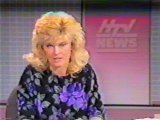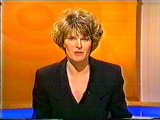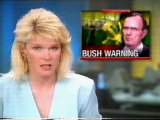Tabloid Baby Burt Kearns Vs. Gay Mafia
I've been reading an absorbing book published in 1999 - Tabloid Baby by Burt Kearns. He was manaing editor for such tabloid TV shows as A Current Affair and Hard Copy.
He writes about Jessica Savitch, my favorite news anchor babe: "...the luscious lisping blonde sex kitten... No other newswoman inspired such slack-jawed admiration among male viewers... I never would have guessed she was a coke-sniffing basketcase whose boyfriend, the previous WNBC news director, beat the sh-- out of her and turned her into a lesbian."
Kearns writes about the clash between his Australian tabloid buddies and Fox's head at the time, Barry Diller and his "Velvet Mafia."
To Diller, "the Aussies were unwashing homophobic ruffians... Hollywood was a place where untold secrets unfolded in the back of limousines and behind the walls of cloistered mansions, where rubber sheets covered priceless bedspreads...
"The manly men from Down Under had little reverence for the pampered poobahs of screenland and the secrets they held. They laughed at the Diller crowd and their fancy-pants airs. To be blunt, the Aussies regarded Barry Diller and many of his young male executives to be gay, and the Aussies referred to gays as "poofters." Diller...hated A Current Affair..."
A Current Affair planned to do a story claiming that homosexual Cary Grant was straight. Their ad, written by Greg Snead, read: "Cary Grant: No More Fairy Tales."
Diller phoned: "The...word...fairy...makes...my...BLOOD...BOIL!"
Diller cancelled the entire month of A Current Affair's TV Guide ads and demanded to see copies of every promotional item Greg Snead had written in the past two years. (Tabloid Baby, pg. 46)
Kearns hired homosexual Paul Nichols, to directed a pilot of FUNY, as in F--- You New York. Paul couldn't understand a heterosexual funny bit with a beautiful woman doing a US weather map while wearing a spandex miniskirt.
Gordon Elliott read his script as sportcaster Adrian L. Adrian in a lisping effeminate voice of the stereotypical Aussie "poof." Paul got mad and walked out of the control room. Everything stopped until Elliott agreed to read it "straight." (Tabloid Baby, pg. 112)
When Anthea Disney took over A Current Affair, Kearns and company left for Paramount's Hard Copy. Maureen Boyle replaced Maury Povich as host of A Current Affair. During an impasse in her marriage, Anthea moved in with Maureen. Rumors spread they were lesbian lovers. They had a huge fight in the office. Anthea forced Steve Dunleavy to phone New York Post editor Jerry Nachman to beg him not to run a story on the tiff. It never ran. (pg. 159)
"One reason Hard Copy almost sank in its first season was the flaunting of a hipper-than-thou image of pointy-headed liberals from El Lay. They tried to educate viewers on what to think..." (pg. 197)
3/1/05
I walk into Burt's office. He's glued to coverage of another female teacher who had sex with her underage male student story.
We have lunch Tuesday in Culver City. I ordered a vegeburger with fries and Burt (producer of Showtime's My First Time series) got a chicken salad.
Luke: "What is it like to come back to A Current Affair (tabloid TV show relaunching March 21) after you burned a lot of bridges with your book Tabloid Baby?"
Burt: "I did burn a lot of bridges with my book with a lot of people. At the same time, when my book came out, I found out who my friends were."
Burt's cell phone rings with the tune from ACDC's Back in Black. He ignores it.
Burt: "When Peter Brennan met with me and invited me to come back to A Current Affair, I was surprised and humbled."
Rupert Murdoch has little patience. First, he wanted to create a TV newsmagazine that resembled the tabloid energy of News Corp. newspapers. Then he wanted to debut it in four weeks. To make that happen, he tapped Peter Brennan, one of his favorite producers. The Sydney native had started a hit morning show for News Corp.
Burt: "I didn't think I'd ever be doing that again. That book was my farewell to tabloid TV. Although in the ensuing years, I became a standardbearer [at www.tabloidbaby.com] for doing good tabloid. I got a lot of response from the website. People from around the country contributed stories from papers around the world that, if there was a real tabloid TV show out there still, and these would be the stories we'd cover. Again, the stories we got were not coming out of the Globe or The Enquirer or the Weekly World News, but the Guardian, the Independent and The New York Times.
"Coming back to A Current Affair, as we look for stories, we are finding them in small town papers again. We are not getting them from the E! news daily website.
"Peter invited me to come back to New York to work on the show. I have a family now [one wife and two kids]. I have a production company. I'm tied to LA. When I told Peter that, he said I could do whatever I wanted on the West Coast. I'm running the West Coast operation."
Luke: "How did your book affect your life?"
Burt took notes all through his tabloid days and began writing the book in 1996. It was published in 1999.
Burt: "I still have cocktail napkins from 1989 that I had written notes on.
"I had tremendous interest from publishers in New York. I had a hot agent, David Vigliano. My dear late friend Neal Travis [who invented Page Six in the New York Post] helped me get the agent. I started writing it on deadline. I wanted the last chapter to be the birth of my [first] son. I finished writing it in 1996. Vigliano got it out to a bunch of publishers in New York. There was some snobbishness. New York publishers didn't think anybody would be interested in tabloid television. A Current Affair had just been canceled.
"Then, Anthea Disney, who replaced me as managing editor of A Current Affair after Rupert Murdoch took her from newspapers in Britain, became the head of Harper Collins [book publisher owned by Murdoch]. Word went out from New York that this was not a book to publish. Everything went cold. Over the next couple of years, I worked with editor Ed Breslin. We went out and got another agent, Jimmy Vines.
My attorney, Paul Sherman, an old school New York business attorney who secured the book deal for Xaviera Hollander when she did The Happy Hooker, and for Joan Rivers, told me he had a publisher in Nashville, Tennessee -- APG Books. We made a deal. They did religious books and children books and had just started a pop imprint called Celebrity Books. They did a book by Georgia Durante who was married to a mobster in New York. She was his getaway driver. She came to Hollywood and became a stunt driver. The Company She Keeps. My book was the second under that imprint. My book was going to be the one that would blow everything open to tremendous publicity.
"We published it in October 1999. It started hitting the bookstores in December. We did a book launch party at the Bel Age on the Sunset Strip, where a lot of the action took place. The following week, we did a launch party at Elaine's in Manhattan.
"I was booked by my publicist on Good Morning America, NBC Dateline, MSNBC, CNN... The week I got to New York, every booking I had was canceled. The bookers, the young kids who saw the book, thought I'd be a great guest, but when their bosses saw it, they said, we're not putting this guy on television. Look at what he says about Tom Brokaw, Bryant Gumbel.
"I let everything hang out in that book. I wrote it as a screed at first then I rewrote it over three years. At a time when Howard Stern's books were big sellers... I used common language, tabloid language. I didn't pull any punches on my own misdeeds or other people's.
"I wasn't out to get anyone. I just told it like it was.
"I found out that the people who were most offended by it were people who I worked with... People who spent a better part of ten years making other people's lives miserable were so offended that I would write about them.
"I had several purposes for the book. One was my memoir. I was also telling the story of tabloid television, how it changed television and how it fell."
Our food comes but our interview rolls on.
"I was telling the story not through corporate shifts or audience tastes, but like Saving Private Ryan, through one platoon. How the day-to-day story decisions made the genre successful and ultimately made it tawdry and killed it.
"I expected that one of two things would happen: I'd be massively successful and launched into a new life as an author, or no one would notice the book and I'd be known as that little c--- who wrote that book about his friends and would never work again. I never expected the middle, which was that everybody would read the book. It was the most Xeroxed book in the history of television when the galleys came out. Everybody would know about it. But it would sell in New York and LA and a few copies in Chicago because of the media blackout on the book."
Luke: "Didn't you have to sell your Porsche?"
Bert: "I had to sell it in 2000 because work stopped. There were threats made... Paramount tried to stop the book. They put out a cease-and-desist letter that my deal at Hard Copy included a confidentiality clause. I was not allowed to relay my experience. We fought that and won quickly but it cost $10,000 in attorney fees.
"Some people I'd worked with stuck up for me."
Luke: "How much money did the book cost you?"
Bert: "About half a million dollars.
"The book did launch me in a different direction. I worked quietly under the table. I met Brett Hudson and we started a company [Frozen Television] together.
"Henry Schleiff, the president of Court TV, is mentioned [unflatteringly] in my book.
"At my book party at Elaine's in New York, Henry had two producers waiting at the door. They said, Henry has read the part you wrote about him in the book and wants to apologize to you. On an unrelated matter, he would like to hire your wife as the host of this show on Hollywood and Crime.
"I met Henry. He embraced me. We had awkward funny moments. He said, this part was right. This part wasn't. Henry gave my company four hours of documentary work.
"You start feeling humbled. You start realizing you hurt people's feelings.
"John Parsons gave me my first job in television at Channel 5 News in New York in 1980. John became my competitor when I went to A Current Affair and he started up Hard Copy.
"John helped me out.
"I started doing documentaries. We started working with Albert S. Ruddy, who is old friends with my partner Brett Hudson. We interviewed Al for the [Legs McNeil] porn documentary we did for Court TV. Al had dealings with the Perainos and was open and funny about it. Al produced the movie Coonskin (1975) and couldn't get it distributed. Barry Diller refused to distribute it so he went to Butchie Peraino."
One of Burt's assistants stops by the table: "We're going to head out. We weren't able to make contact with the girl. She lives in Orange County. Steve is going to try to talk her into it."
Burt: "Is she in school or what?"
Assistant: "No."
Burt: "Have fun."
The guy leaves. Burt turns to me. "We're doing a story on a student at San Diego State University, Steve York, who directed his own porn film and showed it on television. We went with him yesterday when he went on a job interview to Hustler. Hustler apparently offered him a job."
This is a partial transcript from "The O'Reilly Factor."
Burt: "We wrote a treatment with Al for a Hallmark movie based on Jimmy Carter's childhood memoirs. We wrote and produced the movie Cloud Nine with him."
Luke: "What killed tabloid TV?"
Burt: "When tabloid television first raised its head with A Current Affair, it had an entire part of America to itself. The networks covered events on the East Coast and Europe. They came out to LA if a movie star died or there was an earthquake. The rest of America was known as fly-over country.
"Whenever they covered America, what they know refer to as the red states, they show a picture of a thresher going through a field or hot iron ore being poured in a factory, and call it the America story.
"A Current Affair was going out to the middle of the country and taking small town dramas that gave you a picture of what was really going on. You could see America's alternative morality. People were buying homevideo cameras and making sexy movies. People were hiring hitmen. The minister was having an affair with the organist.
"It was showing what was really going on in America. It was covering America in a new way. It was breaking down these barriers of reporters in trenchcoats reporting and having ordinary-seeming people cover stories. It democratized newsgathering. It was a real threat to the networks, who slowly began to coopt it.
"As tabloids became more successful, A Current Affair spawned Hard Copy, Inside Edition, American Journal, Extra and Day & Date. The people who worked on the original show became spread out. Former network people came in such as John Terenzio (formerly of NBC) took over A Current Affair. Tabloid newspaper reporters started running the shows. The story selection got more sleazy. They were going for ratings. One of the stories that killed tabloid was one of the greatest -- Joey Buttafucco [and his mistress] Amy Fisher. It was a miracle story where the girl shot the wife and the wife not only survived but came up swinging and said, I defend my husband. You couldn't feel sorry for the wife was so combative in the face of all facts that her husband had had this affair. There was no one that you could root for.
"Then came O.J. Simpson. That changed everything. When the murder happened, nobody really covered it. Mr. Simpson had not been charged. For a week, we had a latenight show Premiere Story that was going to go up against Nightline. When Nightline covered Bosnia, we'd be covering Madonna.
"We had the O.J. story to ourselves for an entire week. When Ted Koppel first covered it, he apologized. He said some things are not important but there's interest and we have to cover it.
"After that low speed chase, and he was arrested, all the networks jumped on the story. There was live court room coverage during the day. Jay Leno making jokes at night. The tabloid shows were pre-recorded. All they could do was buy witnesses that would spoil the case and do the same stories with alliteration and music. There was no reason for these shows to exist. That killed it. The networks became tabloid covering Columbine, John John Kennedy's death, Princess Diana... The networks weren't covering these stories in the right way. They were still doing it with the network distance and loftiness.
"You watch NBC Dateline and they make fun of people.
"Just recently, there was a story in San Francisco. A bunch of workers for the gorilla foundation, a bunch of women who worked for Coco the Talking Gorilla, have sued because they claim they were forced to show their breasts to the gorilla.
"A Current Affair is back. We got in touch with the lawyer for the women and said, we want to do your story. The lawyer said no. I'm only dealing with mainstream news organizations. I'm not going to deal with something like A Current Affair.
"He appeared on CNN. Jenny Mouze (Making The Mouze of it) did a segment called Monkey Business at the Zoo. It lasted 125 seconds. It was all jokes. They made fun of the lawyer and they made fun of the women.
"I wrote the lawyer an email: If you want to see what mainstream legitimate news does to you, watch the piece. They made fun of you. They made you look like an idiot, like a sharpie trying to make some money.
"He wrote back and said he is re-evaluating everything. We're in a deal now to get the four women who are suing. Another woman every week comes forward...
"The networks will cover the material but they still look down their noses at it. These are people who look at my salad and know the names of the various leaves. They go to their little markets and that's the life they live.
"That's what killed tabloid and that's what's left a great opportunity to bring it back.
"If Entertainment Tonight does a three-minute story, it's a special feature. They're all doing Hollywood. They can't write the long-form stories. A Current Affair is going to do stories that are twelve minutes. That's an eternity in television."
Burt tells me the story behind his site SaintMychal.com. "I'm doing TabloidBaby.com and every year for publicity I put out a press release. Remember Andrea Thompson from NYPD Blue who became a CNN newscaster? I named her newscaster of the year.
"I'm looking for something to publicize. At the end of 2001, there's a little item in Parade magazine (Walter Scott Personality Parade): There is a prayer going around called Michal's prayer.
"Mychal Judge was the fire department chaplain who officially was the first casualty at the World Trade Center. He heard the call and went in with the other firemen. When the second plane hit, Mychal was hit by some debris and died. There's a famous photo of him being carried out on a chair and laid his body to rest in a church next door that was miraculously untouched.
"Then I saw another article on the front page of The Los Angeles Times who have been talking about him. I looked into it. I saw that the gay activists said he was gay. And he was an alcoholic.
"I put together a release saying the Catholic church is going to find itself in a quandary. They're going to be faced with canonizing a gay alcoholic priest. Neal Travis picked it up in his column. People started emailing me.
"My old friend Wayne Darwin said, 'Mate, you ought to make this into a website and sell t-shirts to the gays.'"
Burt's wife Alison Holloway walks up. Burt introduces me as someone with "heavy religious issues."




From this web site:
Alison Holloway, co-presenter of HTV News in Bristol during the 1980's. Alison was chosen to co-present ITV's Olympic 1988 coverage with Nick Owen. Alison was quickly snapped up by Sky at the launch of Sky News in 1989. She then helped launch the South East edition of Meridian Tonight in 1993.
We talk about Benny Hill getting taken off the tele for making Paki (Pakhistani) jokes and pinching women on the bum.
Allison: "In our house it was all Benny all the time because I had an older brother."
Burt: "My friend Jimmy Sheehan put together this website. We put his story and articles about him. Within two weeks, we started getting emails from around the world. 'I knew Mychal Judge. He cured my baby of cancer.' 'I knew Mychal Judge. He...' 'I have a child with severe deformities. I've named him Mychal. I pray to Mychal every day.'
"From Perth to Germany, from around the world, people started emailing me. 'G-d bless you for doing this.' It's become this responsibility, this movement around the world.
"We get a few articles done.
"I'm on the set of My First Time. Some house in Van Nuys. Shooting the porn. I get a call on my cell from a reporter from The New York Times. He wants to do a story on SaintMychal.com. I start telling him the story. He says, what movement? You're making this up, aren't you?
"I say, I'll get back to you. I went home and got every email and put together this big memo for the guy from The New York Times. A week later, a front page story in The New York Times interviewing all the people I had sent him to.
"People were emailing that we were trying to bring down the church, that we were gay activists. His order, the Franciscans, unfortunately, is known as the gayest order in the Church. They washed their hands of it.
"We've kept the thing going as an ongoing research project. Great Britain did a documentary. Michael Daly at the New York Daily News is writing a book about Mychal Judge.
"It's been a weird sidetrack. My wife doesn't know what the hell is going on. She thinks I have some strange Catholic issues.
"When I was first interviewed, they asked me for my religion. I said I was a lapsed Catholic. I don't go to church. Then I was given advice to never say that. Say that you're a fine Catholic. You don't want people to think that you are someone from the outside trying to tear down the Church."